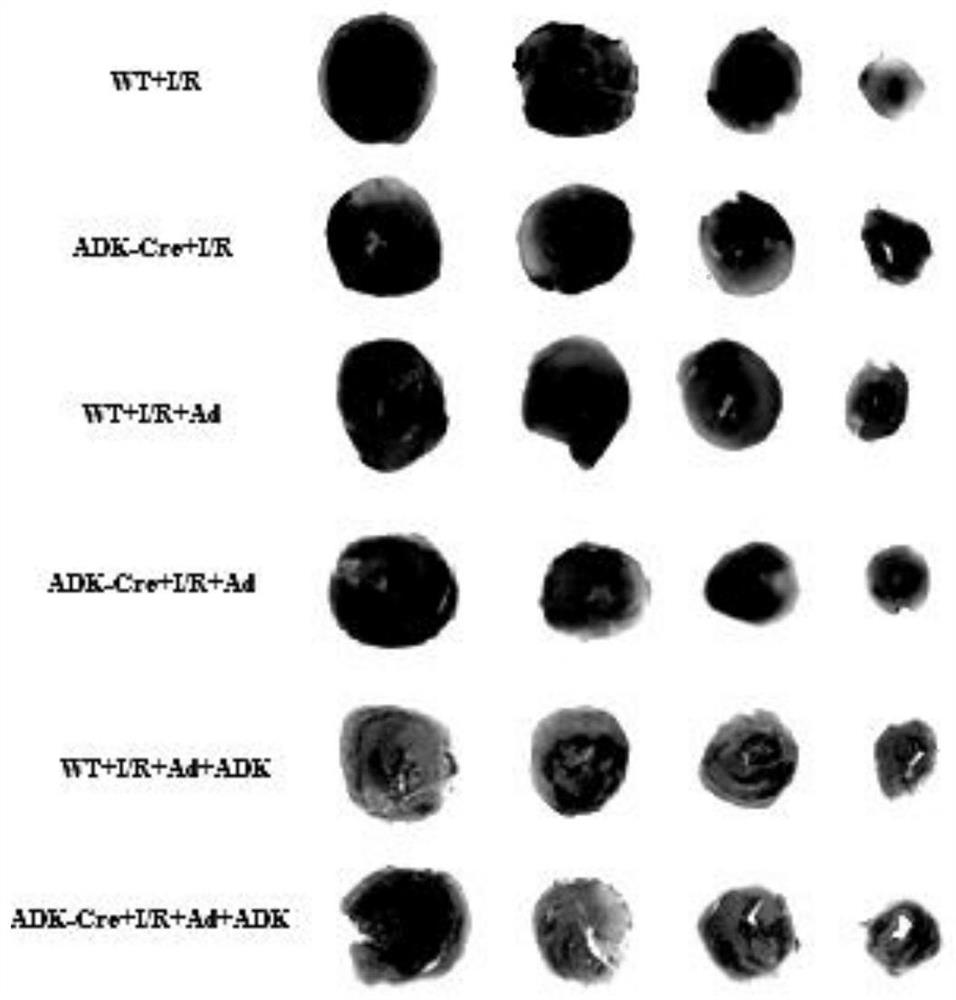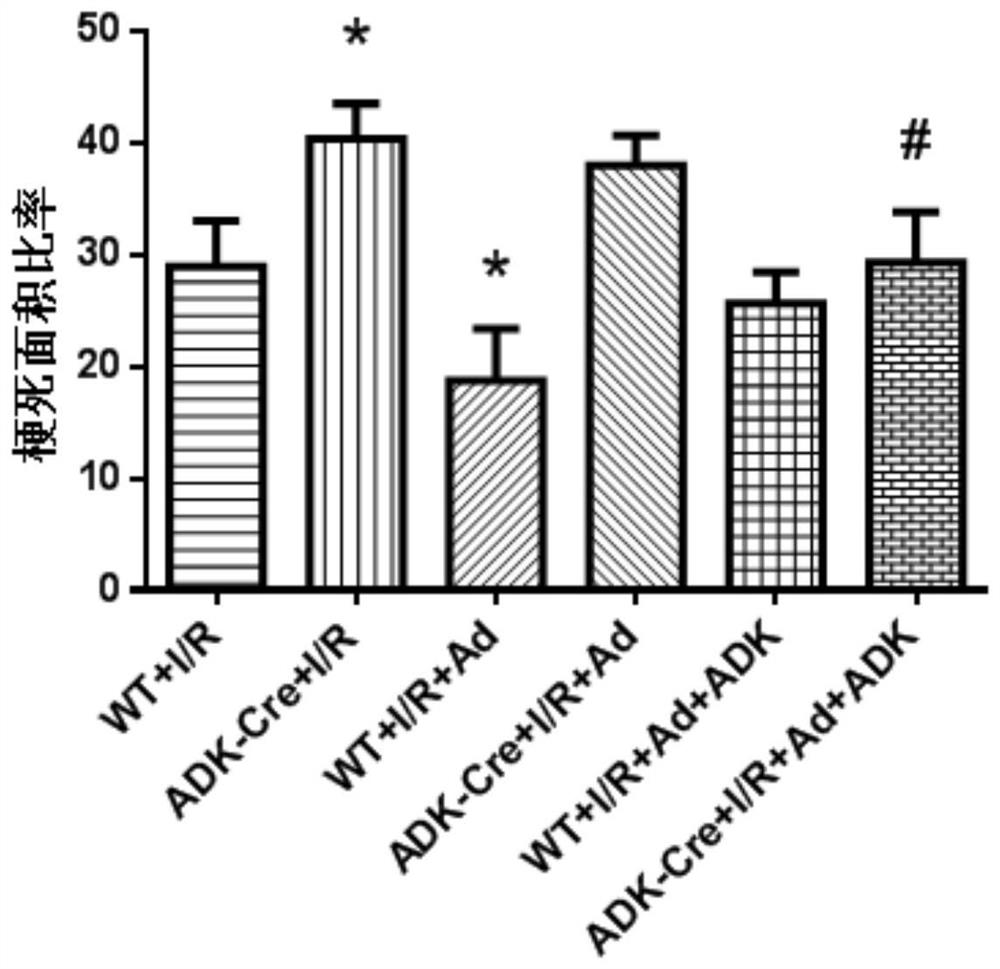A drug delivery system for percutaneous coronary intervention
A drug delivery system and coronary artery technology, applied in the field of medicine, to increase the activity of adenosine kinase, improve the metabolism of adenosine, and improve the protective effect of myocardial reperfusion
- Summary
- Abstract
- Description
- Claims
- Application Information
AI Technical Summary
Problems solved by technology
Method used
Image
Examples
Embodiment 1
[0037] The construction of embodiment 1 mouse model
[0038] 1.1 Experimental animals
[0039] Prepare 8-10-week-old adult male C57BL / 6 ADK-Cre mice (ADK-Cre) mice, weighing 24.5g±0.8g; prepare 8-10-week-old male C57BL / 6 mice (Wildtype, WT) Mice, weighing 24.2g±1.1g, were used as a control group. The myocardial-specific ADK knockout (ADK-Cre) mouse model of acute myocardial infarction used in the experiment was constructed by the Animal Experiment Center of Zhongshan Hospital Affiliated to Fudan University; the wild-type mouse (WT) acute myocardial infarction model was established by Zhongshan Hospital Affiliated to Fudan University Provided by the Animal Experiment Center, the purchased mice were raised in the SPF animal room of the Public Health Clinical Center Affiliated to Fudan University. During the experiment, they were all raised in the SPF animal room of the Experimental Animal Center of Zhongshan Hospital Affiliated to Fudan University. After 3 days of adapting to ...
Embodiment 2
[0048] Embodiment 2 percutaneous coronary intervention
[0049] For myocardial ischemia-reperfusion (I / R), see the steps in Example 1, wherein the steps of simulating traditional adenosine injection and the adenosine + adenosine kinase percutaneous coronary intervention proposed by this patent are as follows:
[0050] (1) Traditional adenosine injection
[0051] Before step 6) of "drawing the slipknot" in Example 1, inject adenosine solution through the tail vein of the mice. 20mg of adenosine is dissolved in 50ml of physiological saline to form an adenosine solution.
[0052] (2) Adenosine + adenosine kinase injection
[0053] Before step 6) of "drawing the slipknot" in Example 1, inject adenosine solution through the tail vein of the mouse. Then inject and infuse 100 μg / ml human recombinant adenosine kinase physiological saline solution in the same route, the dose is 1 μg / kg body weight.
Embodiment 3
[0054] Embodiment 3 mouse model anatomy experiment
[0055] 3.1 Principle of Evan blue / TTC staining:
[0056] After coronary attention, Evans will enter the unligated coronary artery in the coronary system and stain the normal myocardium, while the ischemic area will not appear blue due to coronary artery obstruction;
[0057] As a fat-soluble light-sensitive complex, TTC (2,3,5-triphenyltetrazolium chloride) is the proton acceptor of the pyridine-nucleoside structural enzyme system in the respiratory chain, and reacts with dehydrogenase in normal tissues It is red, but the dehydrogenase activity in the ischemic tissue decreases and cannot react, so it will not change and appear pale.
[0058] 3.2 TTC solution preparation:
[0059] ①0.1M Na 2 HPO 4 : 14.2mg dissolved in 1L double distilled water;
[0060] ②0.1M NaH 2 PO 4 : 12mg dissolved in 1L double distilled water;
[0061] ③ Mix ① and ② solution, titrate to pH7.4;
[0062] ④ Dissolve 1g of TTC powder in 100ml of ③...
PUM
 Login to View More
Login to View More Abstract
Description
Claims
Application Information
 Login to View More
Login to View More - R&D
- Intellectual Property
- Life Sciences
- Materials
- Tech Scout
- Unparalleled Data Quality
- Higher Quality Content
- 60% Fewer Hallucinations
Browse by: Latest US Patents, China's latest patents, Technical Efficacy Thesaurus, Application Domain, Technology Topic, Popular Technical Reports.
© 2025 PatSnap. All rights reserved.Legal|Privacy policy|Modern Slavery Act Transparency Statement|Sitemap|About US| Contact US: help@patsnap.com



